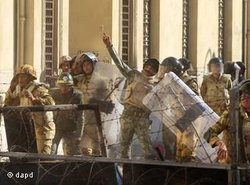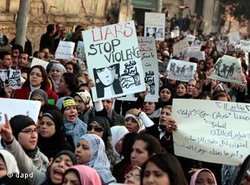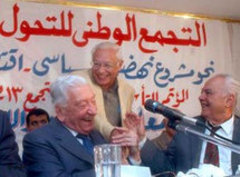Hoping for the ''Second Revolution''
Since late November, Egypt has been in turmoil. Clashes have left scores dead and thousands wounded. Meanwhile, the military appears unwilling to budge on its now entrenched power over the country since taking the helm in February, when former President Hosni Mubarak abdicated his throne atop Egypt.
The violence, in both the November Mohamed Mahmoud clashes and the more recent violence that erupted at the cabinet building in Cairo, has been spurred by military intervention. In November, soldiers attacked a peaceful sit-in in Tahrir Square, beating up a number of activists. When others heard the news, they came to Tahrir to protest and were met by the military's bullets.
Images of bodies being tossed like rubbish to the sidewalk galvanized hundreds of thousands to come to the iconic square, but it was the brave few who stood between the police and military and the masses in Tahrir, throwing rocks at the security forces as tear gas, Molotov cocktails and bullets rained down upon them in a near constant manner.
A chronicle of violence

After the military erected a wall in the middle of the street to end the clashes, protesters moved their sit-in to the cabinet building a couple blocks down the street from the square. They built a makeshift tent city and called for the removal of the interim government.
Instead, on 17 December, the military invaded the area, abducting a protester and beating and torturing him before attacking and burning down the tents. Protesters took to the main Qasr el-Aini thoroughfare in front of the building. Clashes ensued as the military threw stones and large items from the upper floors of the building and shot rubber bullets and live ammunition.
The clashes lasted five days, leaving at least 17 people dead and hundreds wounded in the latest violent crackdown by the military, which had promised when it took power in February to be the caretaker of democratic change for only 6 months. That was 11 months ago.
Elections have gone ahead. Voting has taken place as families bury their loved ones and the military purports a scenario of events that contradicts reality and honesty. The past month has proven that the new dictator is the same as the old dictator.
George Ishaq, a leading political figure and member of the National Coalition for Change, is anxious. He worries that more and more Egyptians will be killed as protests continue and the military resorts to violence as a means of controlling dissent. He feels that the country needs a new revolution. "It is time for the military to go and they won't do it by themselves. We must show them Egypt is not a military dictatorship," he says. "What I fear is that the activists fought and died in January and February to make change happen, but now it is the same. We have to fight and die to get anything better for Egypt."
Unfortunately, he is right. Too many Egyptians have died at the hands of the government, whether it be Mubarak's goons or the military junta's bullets. The difference today is that there is a perception that the protesters on the streets do not speak for the majority of Egyptians.
The "voiceless middle class"

Commentators have discussed in detail the "Tahrir divide" that pits the so-called liberal activists against the rest of the population and the Islamic groups, such as the Muslim Brotherhood and the al-Nour Salafist Party – both of whom won the lion's share of votes in the first two rounds of parliamentary elections – but there is an error in this perspective. The protesters on the ground, throwing rocks and putting themselves in harm's way, are not for the most part the elite; they are the true voiceless middle-class.
A singe figure puts this into perspective: approximately 5,000 protesters have been injured in the past month-and-a-half of violence. That's a sizable portion of the stalwart activists who would be likely to be on the streets, but they have to recover from their wounds, many of them eye injuries, broken bones and other wounds that demand rest and recuperation. An unknown number have also been detained and arrested by the military and the police.
Certainly, it may not be the majority of the country, but no movement has seen the majority of any country take to the streets to protest. Some are able to carry the mantle of change while others provide support in their own way.
Pro and contra
I have spoken with a number of 20-somethings working in cafés and shops across downtown Cairo over the past few weeks. For them, it is almost unanimous: they support the protesters and hope for an end to military rule.

It is easy to find the opposing side on the streets of Egypt. Many would simply prefer to have the country return to stability – or their perception of that concept – and have voiced their desire for the Mubarak era to return. "Nobody was killed on the streets when Mubarak was president," one taxi driver told me recently as we drove through Tahrir Square. He was angry at the protesters, blaming them for the violence and destruction of his city.
The reality is that taxi drivers and others who believe that the protesters are the ill of society are falling victim to the use of state media, or propaganda, by the military. Generals deliver diatribes on the country's media, detailing how protesters used "excessive force" and are "destroying the revolution and the economy" of the country.
Ahmed Aggour, a young activist on the frontlines of any battle, said this is the crux of the matter. Egyptians, he believes, "are ill-informed. What needs to happen is a changing of media. We have to deliver the truth to the people about what is happening, because the military is telling them lies and they believe it."
He's right. The military's use of state-run media would make the Nazis proud. The manner in which they turn an event and lay the fault and blame on the protesters is disgusting. And people watch it and believe it. Take my mother-in-law, an elderly Egyptian woman, for example. She argued, the day after I was detained by the military, that "the military is protecting people from violence." She pointed to the burning of the Institut d'Egypte in downtown Cairo as evidence the protesters "are not there to support Egypt", even though a video supplied by activists has shown that it was the military and police who actively set fire to the building.
Discussing public opinion is always difficult, but as Ishaq and others tell me, "the time is now to push forward. We will have revolution and it will come. Soon."
Already, as 25 January – the anniversary of the first day of the uprising that ousted Mubarak – creeps closer, Egyptians from all walks of life and the predominantly middle-class activists from across the country are preparing themselves for what they are dubbing the "second revolution."
Hope is ripe in Egypt, and even as commentators criticize the activist community, the true protesters on the ground – the middle-class who for the past five decades have been left aside from political debate – are gearing up for a confrontation to bring the revolution 360 degrees.
Joseph Mayton
© Qantara.de 2011
The American journalist Joseph Mayton is editor-in-chief of the Cairo-based website Bikyamasr.com He reports regularly from Egypt and the Middle East.
Editor: Aingeal Flanagan/Qantara.de
